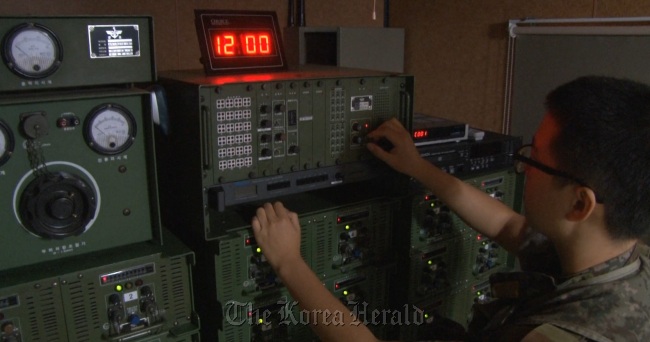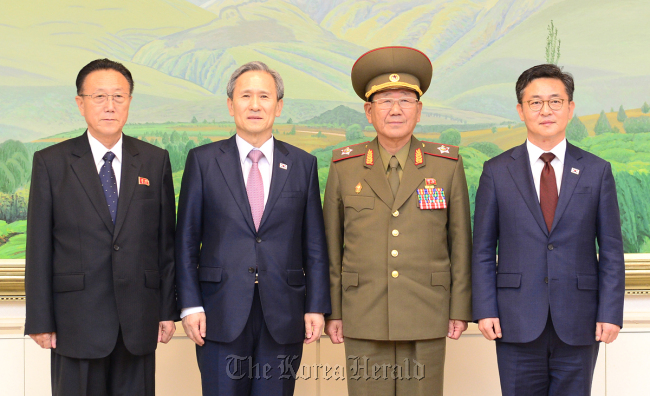Following a hard-fought breakthrough, the two Koreas began taking steps Tuesday to defuse tension on the peninsula, as the South halted anti-Pyongyang broadcasts along the border as of midday and the North lifted its “quasi-state of war” and was seen reinstating some frontline military forces.
The broadcasts and wartime declaration came to an end at noon, hours after the two sides clinched a six-point agreement in which Pyongyang displayed regret over a recent land mine blasts in the Demilitarized Zone and ensuing wounds on two South Korean soldiers in return for Seoul’s conditional cessation of loudspeaker operations.
 |
|
A soldier turns off the power switch for the loudspeakers installed along the border Tuesday at 12 noon. |
They also agreed to hold formal talks in Seoul or Pyongyang “at an early date” to explore ways to mend their ties and have a working-level meeting in early September to arrange a fresh round of reunions of separated families in time for the Chuseok holidays at the end of the month.
The announcement followed 43 hours of negotiations that kicked off Saturday. Kim Kwan-jin, chief of Cheong Wa Dae’s National Security Office, and Unification Minister Hong Yong-pyo sat face-to-face with Hwang Pyong-so, vice chairman of the North’s National Defense Commission and director of the General Political Bureau of the Korean People’s Army, and Kim Yang-gon, director of the North’s United Front Department and a secretary of the ruling Workers’ Party’s Central Committee, in the border village of Panmunjeom until early Tuesday.
“We focused on extracting an apology for the land mine provocation and other recent incidents by North Korea as the subject (of the talks), and a promise to prevent a recurrence, which in fact resulted in protracted negotiations,” Kim Kwan-jin said at a news conference at Cheong Wa Dae.
“But the reason why we ceaselessly called for preventive steps was that otherwise, there would be one provocation threatening public safety after another — we would not have been able to break the vicious circle.”
But criticism lingers over Seoul’s failure to include in the accord a clear articulation of apology and preventive measures, as well as who is to blame for the mine explosions. Seoul officials defended themselves by saying that the word “regret” had never been stipulated in any past inter-Korean statements, while the caveat attached — “unless any abnormal situation takes place” — ensured that the propaganda broadcasts could be resumed at any time if the communist country staged a provocation in the future.
In an apparent attempt to play down the show of regret, the North’s Hwang Pyong-so later in the day repeated Pyongyang’s denial of responsibility for the recent series of its provocations, saying that Seoul fabricated “groundless incidents” and only escalated tensions that could induce an armed clash.
“Through the urgent talks, the South Korean authorities should have realized that its fabrication of groundless incidents and unilateral judgment and behavior would only heighten tensions and could give rise to a military confrontation,” he said in an interview with the North’s Korean Central TV as he assessed the outcome of the talks.
“But we think that it is a relief that our joint efforts set the mood for the improvement of inter-Korean relations,” he was quoted as adding.
 |
|
The delegates of the two Koreas pose after their marathon talks at the border village of Panmunjeom on Tuesday. From left are Seoul’s Unification Minister Hong Yong-pyo; Kim Kwan-jin, chief of Cheong Wa Dae’s National Security Office; Hwang Pyong-so, vice chairman of the North’s National Defense Commission and director of the General Political Bureau of the Korean People’s Army; and Kim Yang-gon, director of the North’s United Front Department and a secretary of the ruling Workers’ Party’s Central Committee. (Unification Ministry) |
Following an 11-year break, the broadcasts were restarted on Aug. 11 along the Military Demarcation Line in retaliation for the Aug. 4 explosion of three mines suspected to have been buried by North Korean soldiers who illegally crossed the border. The blast inflicted serious injuries on the legs of two South Korean Army staff sergeants.
After North Korean leader Kim Jong-un declared a “quasi-state of war” last Thursday, his military put frontline troops in full combat readiness, sharply beefed up artillery forces and forward-deployed a majority of its submarines and other offensive assets.
Signs of de-escalation showed soon after the deal, as some of the submarines that had left their bases appeared to have returned, Defense Ministry spokesperson Kim Min-seok said.
Seoul’s military officials had expressed concerns on Sunday that they were unable to locate about 50 undersea vehicles, or 70 percent of the North’s submarine fleet.
While welcoming the breakthrough, the South Korean military remained cautious, saying it was maintaining maximum readiness, which it would adjust according to the North’s movements. U.S. Forces Korea are likely to take similar steps before lowering their Watch Condition level.
Defense Minister Han Min-koo convened two separate meetings Tuesday to discuss follow-up measures with top military commanders and ministry and Joint Chiefs of Staff executives.
“Even if the North does rescind the semi-war state, it will take a considerable amount of time and effort to bring the already deployed frontline artillery and other military forces back to normal,” Kim said at a news briefing.
“Our military will flexibly downgrade its readiness, taking into account the level of threat from North Korea.”
By Shin Hyon-hee (heeshin@heraldcorp.com)

